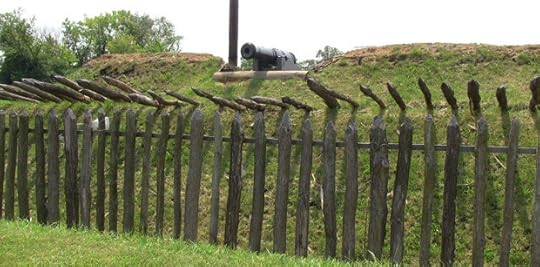Kenneth C. Davis's Blog, page 81
April 17, 2015
The Hidden History of “Patriots’ Day”–Three Things You May Not Know
By the rude bridge that arched the flood,
Their flag to April’s breeze unfurled,
Here once the embattled farmers stood,
And fired the shot heard round the world.
— “Concord Hymn,” Ralph Waldo Emerson (July 4, 1837 Source: Academy of American Poets)
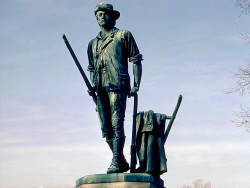
Concord Minuteman by Daniel Chester French (Photo Courtesy of National Park Service
And so it began on April 19, 1775 –240 years ago. A legendary midnight ride. Some Minutemen dropping farm tools and grabbing their guns. And a “shot heard round the world.”
What began that April morning, of course, was the American Revolution. The fighting would last for more than six years, until the last major battle at Yorktown, Virginia and the British surrender there on October 19, 1781. (A peace treaty ended the war officially in 1783.)
Few subjects in American history are draped in as much mythology as the American Revolution and especially the opening salvos at Lexington and Concord. Almost immediately, a proud patriotic narrative of the American Revolution was spun out. Like many such narratives, it was prompted by politics not fidelity to the truth.
“The history of our Revolution will be one continued lie from one end to the other. The essence of the whole will be that Dr. Franklin’s electrical rod smote the earth and out sprang General Washington. That Franklin electrified him with his rod— and thenceforward these two conducted all the policies, negotiations, legislatures, and war.”
—John Adams Letter to Benjamin Rush, April 4, 1790
Here are three quick things your schoolbooks probably didn’t tell you:
Washington’s army of Continentals –not militiamen grabbing trusty muskets—and America’s French allies won the war. Professional soldiers were derided and mistrusted by many of the Founding Fathers, while Washington complained that to rely on the militia was “to lean upon a broken stick.”
About one in five of Washington’s soldiers were black, even though Washington refused to enlist black soldiers when he took command in 1775.
After the British surrendered at Yorktown, Washington’s first order of business was returning some confiscated “property” to rightful owners. Thousands of African American refugees hoping to escape slavery were with the British at Yorktown; they included enslaved people from Washington’s Mount Vernon and Jefferson’s Monticello.
These are some of “untold tales” I relate in my forthcoming book, THE HIDDEN HISTORY OF AMERICA AT WAR. (HACHETTE BOOKS/RANDOM HOUSE AUDIO MAY 5, 2015)
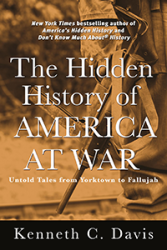
The Hidden History of America At War-May 5, 2015 (Hachette Books/Random House Audio)
April 16, 2015
THE HIDDEN HISTORY OF AMERICA AT WAR-Speaking Calendar

Porter Square Books
List of Speaking Engagements:
May 6 Kramerbooks Washington DC
May 13 Porter Square Books, Cambridge, MA
May 14 RJ Julia Booksellers Madison CT
May 17 US Army Heritage and Education Center Carlisle, PA
May 18 Enoch Pratt Free Library Baltimore, MD
May 23 Barnes & Noble William and Mary Williamsburg, VA
June 6 Printers Row Lit Fest Chicago, IL
June 11 Fraunces Tavern Museum New York City
June 14 Barnes & Noble Tidewater College Store Norfolk, VA
June 18 Mount Vernon Public Library, Mount Vernon, NY
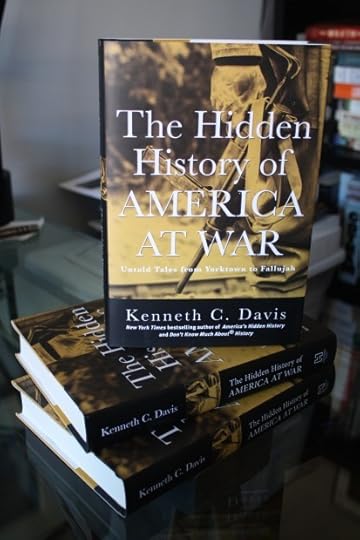
THE HIDDEN HISTORY OF AMERICA AT WAR: Untold Tales from Yorktown to Fallujah (May 5-Hachette Books/Random House Audio)
Speaking at Army Heritage Days- (May 17)
I am honored to be taking part in Army Heritage Days at the U.S. Army Heritage and Education Center in Carlisle, PA.
I will be speaking on Sunday May 17 at 1 PM. The subject will be the stories the schoolbooks leave out when we talk about war –and who fights our wars.
The Heritage Center’s walking trail through military history, includes a recreation of Redoubt #10 at Yorktown which plays a central role in the opening chapter of THE HIDDEN HISTORY OF AMERICA AT WAR
April 15, 2015
Appearing at Printers Row Lit Fest- June 6
I will be returning to Chicago for the wonderful Printers Row Literary Fest on Saturday June 6. More details and specific time and place TBA at the Fest website.
I hope to see you there.
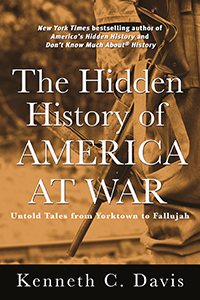
The Hidden History of America At War-May 5,2015 (Hachette Books/Random House Audio)
Speaking at RJ Julia Booksellers (Madison, CT) May 14
I am very excited to join RJ Julia Booksellers and the Madison Historical Society on Thursday May 14 to talk about THE HIDDEN HISTORY OF AMERICA AT WAR.
Hope to see you there.

The Hidden History of America At War-May 5,2015 (Hachette Books/Random House Audio)
April 8, 2015
Speaking at Baltimore’s Enoch Pratt Free Library-May 18
On Monday May 18, I will be appearing at the landmark Enoch Pratt Free Library in downtown Baltimore, Maryland at 6:30 PM. This event is free.
I will be there to discuss my new book, THE HIDDEN HISTORY OF AMERICA AT WAR.
More details and directions are available from Enoch Pratt Free Library.

April 1, 2015
New book lands on my desk!
There are many wonderful days in a writer’s life (–along with some dreadful ones)!

THE HIDDEN HISTORY OF AMERICA AT WAR: Untold Tales from Yorktown to Fallujah (May 5-Hachette Books/Random House Audio)
But few are as special as the day a box of brand new books arrives. There’s a lot of expectation — and some anxiety.
For a few minutes, though, we get to take a deep breath and marvel at the possibilities.
Most of all, you know that there is much hard work still to come –making sure the world knows what you have been doing, locked away in your office for months at a time.
And then I always think of all of the people who made this book possible –editors, designers, copy editors, publicists. There is a great team of them at my publisher Hachette Books and audio publisher Random House.
So, many thanks to all of them.
Watch for more announcements of appearances and bookstore events. And thanks for being readers!
March 31, 2015
Who Said It (3/31/15)
George Washington, “Letter to Touro Synagogue,” (August 18, 1790)

The citizens of the United States of America have a right to applaud themselves for having given to mankind examples of an enlarged and liberal policy—a policy worthy of imitation. All possess alike liberty of conscience and immunities of citizenship.
It is now no more that toleration is spoken of as if it were the indulgence of one class of people that another enjoyed the exercise of their inherent natural rights, for, happily, the Government of the United States, which gives to bigotry no sanction, to persecution no assistance, requires only that they who live under its protection should demean themselves as good citizens in giving it on all occasions their effectual support.
Complete Text and Source: Touro Synagogue
President George Washington visited the oldest synagogue in America in August 1790 while on a tour of New England.
This letter was written to the congregation there after his visit. It stands as one of the great documents in the history of America’s freedom of conscience. The Touro Synagogue website offers a comprehensive history of the letter and its significance.
March 23, 2015
Who Said It? (3/23/15)
Disarmament, with mutual honor and confidence, is a continuing imperative. –Dwight D. Eisenhower

Eisenhower at Camp Meade (US Army, Public Domain Source: Eisenhower Presidential Library and Museum)
President Dwight D. Eisenhower, “Farewell Address to the Nation” (January 17, 1961)
Disarmament, with mutual honor and confidence, is a continuing imperative. Together we must learn how to compose differences, not with arms, but with intellect and decent purpose. Because this need is so sharp and apparent I confess that I lay down my official responsibilities in this field with a definite sense of disappointment. As one who has witnessed the horror and the lingering sadness of war–as one who knows that another war could utterly destroy this civilization which has been so slowly and painfully built over thousands of years–I wish I could say tonight that a lasting peace is in sight.
Complete Text: Teaching American History
This is the speech in which Eisenhower also warned:
In the councils of government, we must guard against the acquisition of unwarranted influence, whether sought or unsought, by the military-industrial complex.
Dwight D. Eisenhower died on March 29, 1969. His New York Times obituary.
May 13-Speaking at Porter Square Books

The Hidden History of America At War-May 5,2015 (Hachette Books/Random House Audio)
On Wednesday May 13, I will be appearing at Porter Square Books in Cambridge Mass., to talk about my new book, The Hidden History of America At War: Untold Tales from Yorktown to Fallujah.
I hope you will join in.
For more information about Porter Square Books.


